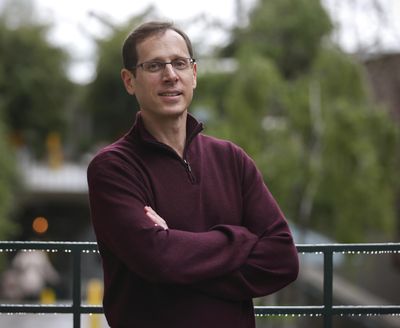Talend CEO sees big gains to come from era of big data

REDWOOD CITY, Calif. – Data is everywhere, and every company struggles to some degree with managing, analyzing and figuring out how to find the best value within all the billions of pieces of information they deal with every day.
For Mike Tuchen, chief executive of data-software company Talend in Redwood City, that situation is an opportunity for growth.
“Every company is a data company,” says Tuchen. “There is data all over the place, and we enable companies to use that data from wherever it might be.”
Tuchen has been Talend’s CEO for almost three years. As a privately-held company, Talend isn’t required to report financial results, but it said that during the third quarter of 2015, its bookings for new software subscriptions rose 136 percent from the prior year.
We spoke recently with Tuchen about Talend, the “Big Data” market and his career. His comments have been edited for length and clarity.
Q: The term “Big Data” gets thrown about a lot these days. For the average person who might not be familiar with it, just what is “Big Data”?
A: You really do hear that a lot, and it’s at the heart of our software. “Big Data” is any information a company gets about its business and its customers. Businesses want to spot trends in their customers’ behavior, and managing all the information and turning that into sales is a huge challenge. And it’s an opportunity for us.
Q: What are some of the trends taking place that are driving the Big Data market these days?
A: One is that we’re seeing an inflection point of the early adopters of the “public cloud” meeting a growing presence of new companies that are taking advantage of what the cloud has to offer with simplicity and making it easier to manage data. Another is how cost-effective using the cloud for data management is. When you can do what you do now for 30 percent less, or more, than what it cost a few years ago, that’s a big source of interest for businesses. Subscription-based services are making this possible.
Q: What kinds of companies are Talend customers?
A: The majority are medium- and large-sized businesses. And they are from across almost every field. There are a lot of retail and health care customers. In retail, it happens a lot where someone will be online, put things in their shopping cart, but then not go through with a purchase. If you can use your data to, say, give them an offer that saves them some money before they leave (a site) and that gets them to go through with their purchase, that’s a sale that you didn’t lose. And in health care, there’s just all kinds of personal medical data that can be used to provide better care at the time when someone needs it.
Q: It seems like you can’t go a week without hearing something new about data security, or a security breach somewhere. How do you address this issue for customers concerned about their data being protected?
A: Well, you have to have a secure product from the start. Larger companies, in particular, are going to have their own security and compliance departments that make sure that whoever they work with has their own security technologies in place. More and more we are seeing security as a concern and if you don’t have your products in place, your customers aren’t going to trust you.
Q: You grew up in the Boston area and went to college at Brown, where you were on the rowing team. How has that experience had an impact on you in the business world?
A: There were so many life lessons from that. How you work as a team, and knowing that you win or lose together was the greatest (lesson). We would train for hours for these 2000-meter races that would be over pretty quickly. We would finish a race and there was the result. You couldn’t argue with it. The only question you could ask is “Why? Why did we do what we did and what can we do to get better next time.”